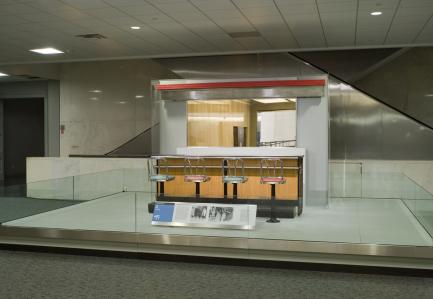Smithsonian Marks 50th Anniversary of Greensboro Lunch Counter Sit-in
In a special evening ceremony today at the Smithsonian’s National Museum of American History, Jibreel Khazan (formerly Ezell Blair Jr.), Franklin McCain, Joseph McNeil and, posthumously, David Richmond—the Greensboro Four—will receive the James Smithson Bicentennial Medal in recognition of their contribution to civil rights in America.
On Feb. 1, 1960, these four African American college freshmen sat down at the Woolworth’s lunch counter in Greensboro, N.C., and politely asked to be served. When they remained in the seats after their request was refused, they ignited a youth-led movement to challenge injustice and racial inequality throughout the South.
A four-stool, eight-foot portion of the Woolworth’s lunch counter is on view at the museum as a powerful artifact of the civil rights movement and represents a community’s defiance of the policy of racial discrimination. The student-led protests involving the lunch counter heightened awareness of such injustices throughout America and were a catalyst to wide spread change.
“The Greensboro lunch counter, one of the museum’s landmark objects, represents the determination of a generation of Americans that decided that segregation was unjust and who worked to end it,” said Brent D. Glass, director of the museum. “The Greensboro Four serve as a reminder that ordinary people can accomplish extraordinary things.”
Smithsonian Secretary Wayne Clough will present the Smithson medals during the ceremony that will also include civil rights leader Rep. John Lewis (D-Ga.) and remarks by the three surviving members of the Greensboro Four.
Throughout 2010, the museum marks the 50th anniversary of this sit-in and other civil rights milestones with programming that explores America’s stories of freedom and justice. More information about the lunch counter, the Greensboro sit-in and how the museum is commemorating the anniversary is available at http://americanhistory.si.edu/freedomandjustice.
The museum’s ongoing theater programs, “Join the Student Sit-ins” and “Sing for Freedom,” engage the public in the spirit of the civil rights movement. The museum will also mark the anniversary when the six-month Greensboro protest ended July 25, 1960, with an agreement to desegregate the lunch counter. For a complete schedule, visit http://americanhistory.si.edu/events.
The James Smithson Bicentennial Medal was struck in 1965 in honor of the 200th anniversary of Smithson’s birth. It was Smithson’s bequest that made possible the establishment of the Smithsonian Institution. This award is given under the Secretary of the Smithsonian’s authority to people who have made distinguished contributions to the advancement of areas of interest to the Smithsonian. Past recipients include John Birks (“Dizzy”) Gillespie, Walter Cronkite, Jacques Cousteau, Sir Edmund Hillary and Steven Spielberg.
The National Museum of American History collects, preserves and displays American heritage in the areas of social, political, cultural, scientific and military history. To learn more about the museum, check http://americanhistory.si.edu. For Smithsonian information, the public may call (202) 633-1000, (202) 633-5285 (TTY).
# # #
SI-54-2010
Melinda Machado
202-633-3129


